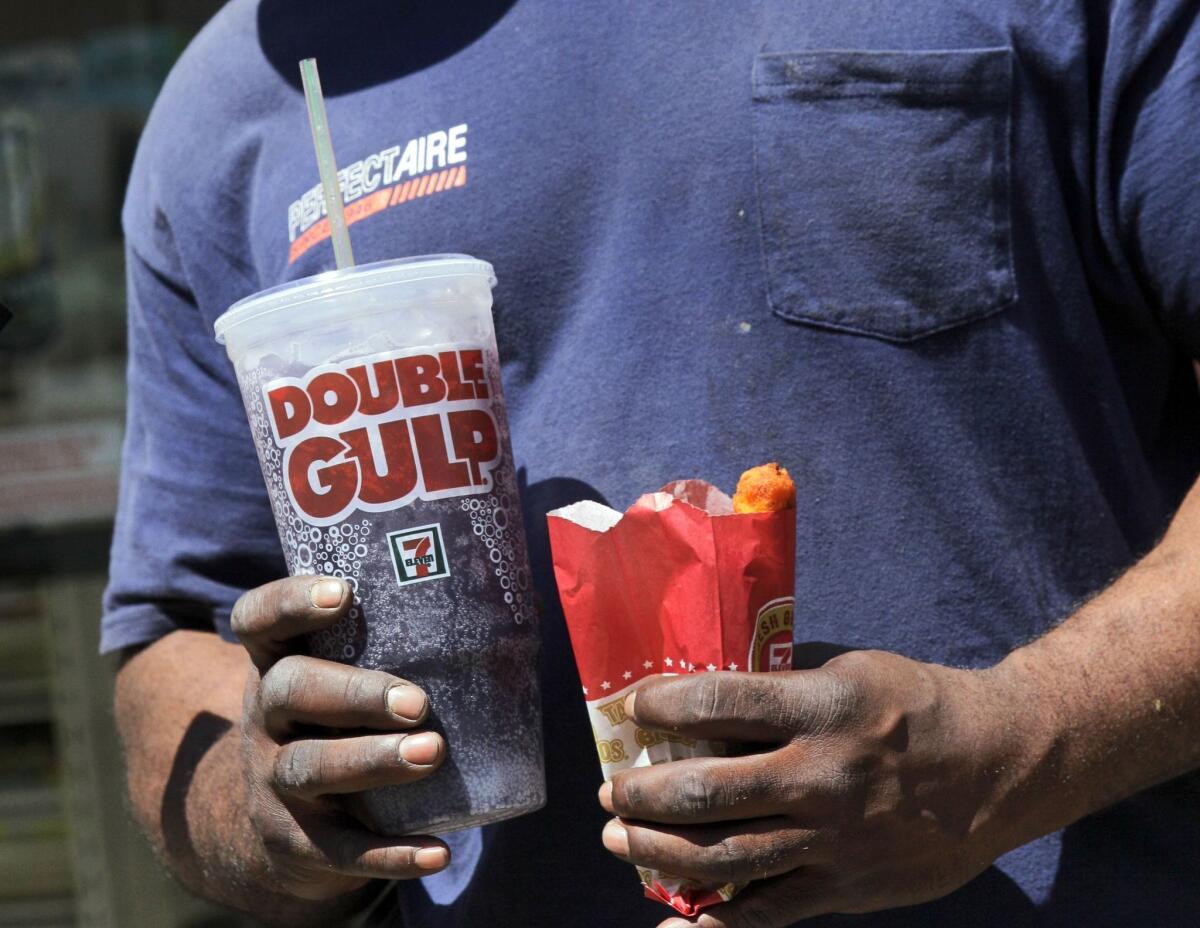NAACP catches heat for opposing New York large-soda ban

- Share via
There’s new fireworks exploding around the plan by New York City Mayor Michael R. Bloomberg — a.k.a. “Nanny Bloomberg” — to ban the sale of sugar-sweetened soft drinks larger than 16 ounces from a broad array of eateries in the city.
That a lawsuit was filed by the American Beverage Assn. and other trade groups to block the city’s move, due to take place in March, may come as no surprise. But nutrition advocates are upset by support that is coming from other, less-expected quarters: the New York State branch of the NAACP and the Hispanic Federation. The two groups filed a brief in support of the food industry’s lawsuit on Wednesday, arguing among other things that the move would hurt minority businesses and asking the city to consider a broader approach (including exercise promotion) to fight the obesity problem that disproportionately affects African Americans and Latinos.
Here is the amicus brief filed by the NAACP and Hispanic Federation.
And here’s a commentary published last year by Hazel N. Dukes, president of the New York State NAACP chapter, in which she terms the soda-size-limit plan “a misdirected solution to the growing problem of obesity” in the African American community and argues that the issue should be addressed more broadly in approaches akin to the NAACP’s Project HELP (Healthy Eating, Lifestyles and Physical Activity), which “educates participants on the risk factors that lead to chronic diseases, including obesity, diabetes, hypertension, stroke and cardiovascular disease” and “develops community health ambassadors to build healthier environments for families.”
Nutrition advocates don’t argue with a multi-pronged approach, but they point to the fact that the NAACP receives funding from Coca-Cola for Project HELP. And they are expressing their dismay.
Michael Jacobson, executive director for the Center for Science in the Public Interest, said in a statement that the organization should give that money back.
“My guess is that the NAACP looks back with some regret at its acceptance of money from Philip Morris and other tobacco companies throughout the 1980s and 1990s, and wishes it could take back some of the favorable things the group said about those companies and its executives, the tobacco sponsorship it accepted for NAACP events, and the times it opposed raising tobacco taxes, and so on.
“I fear that the current leadership of the NAACP will look back with similar regret at its acceptance of money from Coca-Cola and its subsequent willingness to oppose sensible public health measures such as the cap on soda serving sizes proposed by New York City Mayor Mike Bloomberg.”
And here from the Food Politics blog of Marion Nestle, nutrition professor at New York University:
“Public health measures like this are about removing health disparities and giving everyone equal access to good nutrition and health. This makes public health — and initiatives like the soda cap — democratic, inclusive, and anything but elitist… . [I]n funding this suit, the soda industry has made it clear that it will go to any lengths at any cost to protect its profitability — even to the point of dragging along with it the very groups that would most benefit from the initiative.”
HuffPostLive hosted a heated interview with NAACP’s Dukes plus guests with various other viewpoints. (Search for it under “archives” and “business,” then look for the segment called “NAACP Sides With Big Soda.”) When challenged about the NAACP’s position and the fact it receives funding from Coca-Cola, Dukes said: ”We’ve been funded by many corporations,” and “I’m not siding with Coca-Cola.” She said that obesity needs a holistic approach and that you can’t ignore the economic impact of the soft-drink size limit. “Who will be punished? Not the chains ... but the little mom-and-pops,” she said. (Loopholes in the law would exempt many convenience stores, including 7-Eleven, because they don’t come under the purview of the city’s health department.) Appearing to be angry, she eventually hung up on the interview.
Jeffrey Robinson, an assistant professor at the Center for Urban Entrepreneurship and Economic Development at Rutgers University in New Brunswick, N.J., said he didn’t think the soda drink limits will adversely affect small businesses that much. He added, “People can still go drink as much as they want. They just have to do it in portions of 16 ounces or less.”
Food reform advocate Nancy Huehnergarth of New York said: “My concern is seeing any organization … taking money from the soda industry and then feeling that they can then weigh in on soda issues. … You have to wonder if their opinions have been compromised.”
But Kellie Terry-Sepulveda, executive director of the Point, a South Bronx community development nonprofit, said a lot of good can be done with private dollars, and she asked whether enough research had been done to explore the effects of the looming soda restrictions on small businesses.
An editorial in the Baltimore Sun called the beverage industry’s actions “beyond shameless.”
“Why would the nation’s oldest civil rights organization take a stand so at odds with its historic mission of advocating on behalf of issues important to African Americans? The simple answer is: Follow the money. The New York City branch of the NAACP has received tens of thousands of dollars from the Coca-Cola Co. and other beverage companies over the years, and now the industry is demanding payback. Through its longtime Atlanta law firm, Coke literally wrote and paid for the friend of the court brief that the New York NAACP filed in opposition to the ban.”
“How can they look themselves in a mirror knowing they are hurting deliberately the life expectancy and the quality of life for the people that they’re supposed to serve?” Mayor Bloomberg said Friday.
More to Read
Sign up for Essential California
The most important California stories and recommendations in your inbox every morning.
You may occasionally receive promotional content from the Los Angeles Times.













